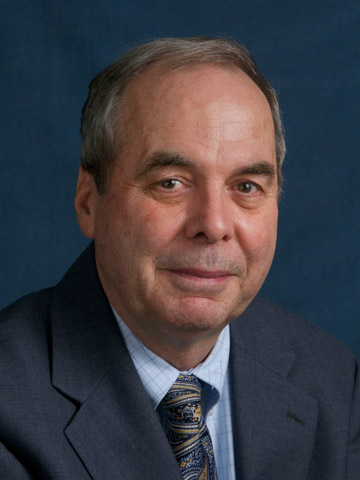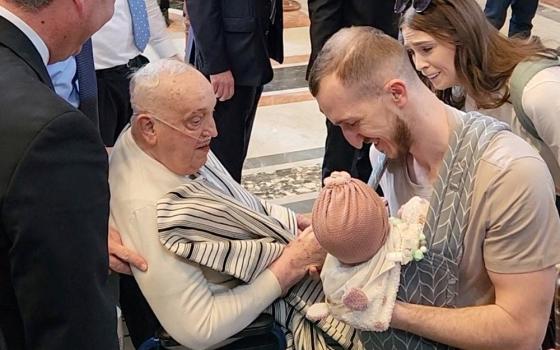
Bob Keeler
Bob Keeler, 68, is known for the impact he made as an editorial writer for Newsday. (He retired at the end of 2012.) Those who read his columns would find it hard to ignore this Pulitzer Prize-winning journalist whose email address begins with "paxbob" and who declared himself "Undecided" two weeks before the recent presidential election.
It's harder to ignore Bob Keeler when you learn that his dilemma was not the choice between the two national presidential candidates. He discounted President Barack Obama because of his use of "killer drones" and Gov. Mitt Romney because Keeler considers his foreign policy advisers "a boatload of hawkish neocons."
Many readers of Newsday, a Long Island, N.Y., newspaper, would remember that in 1992, Keeler cast his presidential write-in vote for Benedictine Sr. Joan Chittister. He could back neither Bill Clinton because of his support of the death penalty nor George H.W. Bush who, in Keeler's words, "gave us the first Gulf War." This time, he was on the fence between again endorsing Chittister or voting for Green Party candidate Jill Stein. I begin by asking Bob about his perceived strengths of these two women.
Keeler: Sr. Joan Chittister perhaps is the best-known and -loved Benedictine nun in America. She's smart, funny and steadfast in her criticism of militarism, patriarchy and other evils besetting the nation and the church.
Jill Stein's a doctor and an environmentalist, and she wants to stop the drone killings and cut Pentagon spending in half.
So it's Joan or Jill for me.
Sr. Camille: Do you mind me asking how you actually voted?
Not at all. I voted for Sister Joan. She was a great president for me the last time: no sex scandals, no wag-the-dog wars. And writing her name in on a paper ballot was a lot less painful than pulling down the little metal door in 1992, which cut my thumb. Back then, I actually I bled for Sister Joan. This time, it was a snap. And I just know I can count on her not to rain death from the sky on people on the other side of the world.
You uphold a Gospel-centered view of war and peace. And your obvious affection for Joan and appreciation of her criticism of patriarchy signal your own spiritually grounded philosophy. What gave rise to those values?
Well, I did study for the priesthood as a teenager. But it didn't take. It's just as well. I wouldn't have been a very good priest. Later, I think it was my own reflections about my brother Richie's death that led to a lot of my thinking on war and peace issues. He served in Vietnam, got exposed to Agent Orange and died at age 36 back here in the States. His death got me rethinking very seriously my commitment as a Christian to peacemaking. Then came the first Gulf War and the invasion of Iraq. Google "War in a Time of Ignorance" for a two-part piece I wrote back then for a fuller explanation of my non-thinking, followed by thinking. (Editor's note: Here are links to part one and part two.)
Who were your mentors, heroes and/or role models?
Sister Joan is one. I first heard her speak at a Thomas Merton event in Rochester, N.Y., and she knocked my socks off with her preaching. Her prophetic critique of the pervasive patriarchy of our church is a gift to all of us. My first-grade teacher, Dominican Sr. Marnette Bamberger, is a model of simple faith and goodness, and we still see each other with some regularity. Fr. Roy Bourgeois is a friend and a role model, no matter what the Vatican says. So was my late friend, Joop van der Grinten, a great lion of a peacemaker, and all my compañeras in Pax Christi Long Island. Also, of course, Merton, Archbishop Oscar Arnulfo Romero, the four church women martyred in El Salvador, and Jack Roosevelt Robinson, a great baseball player and a truly good man.
Where and under what conditions did you grow up?
I grew up in Brooklyn, first in the Marine Park section, then in Flatbush in an apartment over my twin uncles' bar. Then my parents divorced and we moved to Rego Park, and later, Middle Village in Queens. I went to Cathedral College of the Immaculate Conception Preparatory Seminary in Brooklyn but left after four years, bitten by the journalism bug and unconvinced that I'd be very good at celibacy.
How did you meet your wife?
Judy and I met at a going-away party for me at a friend's house in Brooklyn, two days before I entered the Army as a draftee in 1965, the year of the big buildup to the Vietnam War. We celebrate that first meeting every year as our Anniversary of Knowing.
Do you pray together -- in thanksgiving, perhaps?
We pray together most frequently at our evening meal, where we keep in prayer a long list of friends and relatives who are going through tough times of one kind or another. We also pray together at Sunday Mass, of course. And one of our favorite places to pray is at Weston Priory in Vermont, where we like to start off our summer vacation on Echo Lake with Mass with the brothers.
Would you say something about your family -- children, grandchildren?
I have two daughters, Rebekah and Rachel, and five grandchildren. Rebekah's kids are Hailey, Zachary and Dayton. Rachel's are Annie and Leo. I'm the oldest of six siblings, but three of them have died. My sisters are Kathy and Mary Ann.
What about your faith is most important to you?
The Eucharist, Catholic social teaching, Matthew 25:36-41.
Do you have a favorite scripture selection?
Well, I have a lot. I mentioned Matthew 25, where Jesus makes starkly clear what the criteria for the final judgment will be. Then there's Luke 4:16-19, the account of Jesus preaching in the synagogue in Nazareth -- his inaugural address, I like to call it. I also love Philippians 2:6-11, the great Christological hymn that celebrates the kenosis, the self-emptying of Jesus. And Psalms 51, 63 and 139. Just to name a few.
Do they make in difference in your life?
Yes, I feel especially commanded by Matthew 25 and challenged by Philippians 2.
A favorite prayer or way of praying?
I like to pray the Liturgy of the Hours and feel in unison with the rest of the church, but I'm not as faithful about it as I should be.
Newsday identifies you as a member of its editorial board who writes about local politics, the environment, and peace and justice issues. Some of these are hot-button issues. Have any drawn the wrath of readers?
Oh, yes. They call me a lot of names, from "idiot" to "socialist." I try to answer all my emails, and sometimes, people come away from that exchange of emails thinking I'm actually a human being, not a socialist enemy of the state. All I'm really trying to do is point out that our nation has a lot to be contrite about. I don't believe in sports bar patriotism, which moves people to chant simplistically, "USA! USA!" I think constructive criticism of the nation's policies at home and abroad is an essential element of true patriotism. And when I write about the church, I have received some pretty sharp emails condemning me as a dissident and a cafeteria Catholic. One ended with "May God have mercy on your soul," which sounded like what the judge says in pronouncing the death penalty. But I try not to take it too personally.
Many of your stories have moved me deeply. Are there any that had a significant effect on you?
Well, I once wrote a piece about the adoption of Korean twins that moved me immensely. It played a role in our thinking in the months before we adopted our daughter Rebekah. I wrote about an unfair system that a local social services department was using, and they discontinued it almost immediately. And I got to visit the Sea of Galilee and the Mount of the Beatitudes to cover Pope John Paul's pilgrimage to the Holy Land. I had a really tough day logistically, but at the end of it, I ate a meal in a kibbutz on the eastern shore of the Sea of Galilee and cried in gratitude for being there.
The story playing a role in Rebekah's adoption certainly had an impact on your wife. Were there others that drew you closer to one another?
My series about St. Brigid's Parish in Westbury, N.Y., brought us both closer together with Lynn Quinn, a top editor at The Crossroad Publishing Company, who read the series and nurtured it into a book called "Parish!" Lynn became a very good friend to Judy and to me. Lynn and her husband, Bill, introduced us to the Hibernian Festival Singers, and their annual Christmas concert became an important part of our lives. Her long suffering and eventual death from cancer drew Judy and me close together in prayer for Lynn and Bill.
What causes you sorrow?
In others: blind, unquestioning patriotism and reflexive racism. In me: a crazy perfectionism that works well in my professional life, but in my daily life makes me too often Pharisaical.
What causes you joy?
I wish I were a more joyful person and less of a pessimist. But my grandchildren can really make me laugh. And I can be moved to tears of joy by the beauty of our great blue planet -- in places like Alaska, the Grand Canyon and Yellowstone -- by great music and great baseball played with consummate virtuosity, by gorgeous sentences. And speaking of sentences, here's my favorite in the English language: "Mets win; Yanks lose."
If you were to be made a bishop by popular acclamation, what would your priorities be?
That requires a lot of imagination. Nobody in his right mind would choose me for a bishop. But if that impossible scenario were to happen, I'd set my priorities by trying to emulate great bishops I've known: Tom Gumbleton of Detroit, for example, and the late Ken Untener of Saginaw, Mich. Tom has been a powerful, fearless teacher of peace. Ken was great at servant leadership, choosing to live nomadically, out of the trunk of his car, moving from parish to parish. Kind of like, you know, Jesus. Like Ken, I'd work with my brother priests to improve their preaching and my own. I'd use my physical presence to stand with immigrant workers in the streets. I'd lose the bishop's miter, a goofy symbol of triumphant leadership, incompatible with servant leadership.
Is there something you wish I had asked?
Yes. "How do you feel about the Vatican ejecting Fr. Roy Bourgeois from Maryknoll?" My answer: "Really ticked off and profoundly sad."
Thanks, Bob, for your powerful commitment to peace and justice.
[Mercy Sr. Camille D'Arienzo, broadcaster and author, narrates Stories of Forgiveness, a book about people whose experiences have caused them to consider the possibilities of extending or accepting forgiveness. The audiobook, renamed Forgiveness: Stories of Redemption, is available from Now You Know Media.]
Editor's note: We can send you an email alert every time Sr. Camille's column, "Conversations with Sr. Camille," is posted. Go to this page and follow directions: Email alert sign-up.




